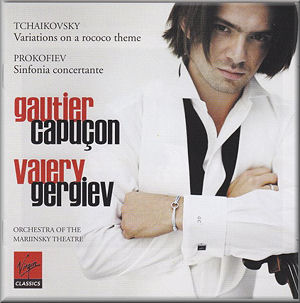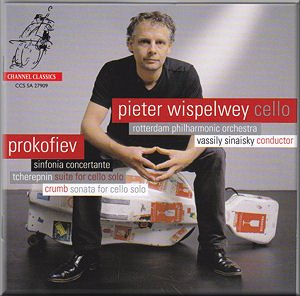 |
 |
|


alternatively
AmazonUK
AmazonUS
|
Sergei PROKOFIEV (1891-1953)
Sinfonia Concertante (Symphony-Concerto) for
cello and orchestra in E minor, Op. 125 (1951/52) [41:40]
Pyotr Ilyich TCHAIKOVSKY (1840-1893)
Variations on a Rococo Theme, for cello and orchestra in
A major, Op. 33 (1876) [19:26]
 Gautier Capuçon (cello)
Gautier Capuçon (cello)
Orchestra of the Mariinsky Theatre/Valery Gergiev
rec. live, 24 December 2008, Concert Hall of the Mariinsky Theatre,
St Petersburg, Russia. DDD
 VIRGIN CLASSICS 50999 694486 0 7 [61:19]
VIRGIN CLASSICS 50999 694486 0 7 [61:19] 
|
|


alternatively
AmazonUK
AmazonUS
|
Sergei PROKOFIEV (1891-1953)
Sinfonia Concertante (Symphony-Concerto) for
cello and orchestra in E minor, Op. 125 (1951/52) [40:04]
Alexander TCHEREPNIN (1899-1977)
Suite for cello solo, Op. 76 (1946) [6:55]
George CRUMB (b. 1929)
Sonata for solo cello (1955) [11:09]
 Pieter Wispelwey (cello)
Pieter Wispelwey (cello)
Rotterdam Philharmonic Orchestra/Vassily Sinaisky
rec. live, November 2007, De Doelen, Rotterdam, Holland (Prokofiev);
December 2008, Doopsgezinde kerk, Deventer, Holland (Tcherepnin,
Crumb). DDD
 CHANNEL CLASSICS
CHANNEL CLASSICS  CCS
SA 27909 [59:45] CCS
SA 27909 [59:45] 
|
|
|
These are interesting and most rewarding releases featuring Prokofiev’s
substantial Symphony-Concerto - a masterwork that deserves
to be far wider known. The Virgin Classics release contains both
Prokofiev and Tchaikovsky’s Rococo Variations; works separated
by over seventy years. The extremely popular Rococo Variations
is frequently performed probably at the expense of the Sinfonia
Concertante, a score that suffers from a comparative
and unwarranted neglect in concert programmes. The virtuoso demands
on the soloist in the Prokofiev, especially in the central
movement, make this one of the most challenging scores in the
cello repertoire.
The blend of French cellist Gautier Capuçon, the Mariinsky Theatre
Orchestra and their maverick Russian-born conductor Valery Gergiev
is a heady and exciting prospect. Capuçon has quickly built himself
a reputation for communicating significant passion in the late-Romantic
repertoire. Whilst the amazingly hard-working Maestro Gergiev
is also renowned for interpretations of real dramatic intensity.
Capuçon plays either a Matteo Goffriler cello from 1701 or a Joseph
Contreras from 1746. I’m not sure which he was using for this
live 2008 Christmas Eve recording at the Mariinsky but I was struck
by the instrument’s rich, mellow and velvety timbre.
Pieter Wispelwey in his Channel Classics release plays his usual
1760 Giovanni Battista Guadagnini cello and is supported in the
Prokofiev by Sinaisky and the Rotterdam Philharmonic. Wispelwey’s
couplings are for solo cello. I have been eagerly anticipating
this release since I saw the disc back in September 2009 displayed
in the music department of the famous department store Ludwig
Beck in the Marienplatz, Munich.
The Prokofiev work has a convoluted history and started out as
a cello concerto. Encouraged by cellist Gregor Piatigorsky Prokofiev
made sketches for his Cello Concerto No. 1 in E major,
Op. 58 as early as 1933. The score was introduced in 1938 at Moscow
by another cellist Lev Berezovsky and the USSR State Symphony
Orchestra under Alexander Melik-Pashayev. Poorly received, Prokofiev
felt the score needed alteration and he set about extensive rewriting.
At Boston in 1940 Piatigorsky gave the American première of the
score in its revised form. Some years later in 1947 Prokofiev
attended another performance of the neglected concerto given by
cellist Mstislav Rostropovich at the Moscow Conservatoire. Rostropovich’s
playing sparked Prokofiev’s fresh interest in the score and with
assistance from the great cellist in 1950-52 he undertook yet
more revisions. At the 1952 introduction of what was briefly known
as his Cello Concerto No. 2 Rostropovich was the soloist
under Sviatoslav Richter. Renowned pianist Richter was making
his rather unlikely conducting debut with the Moscow Youth Orchestra;
seemingly his only public attempt at conducting. Prokofiev made
additional revisions recasting the score as his Sinfonia Concertante
for cello and orchestra in E minor, Op. 125. Incidentally
the score is sometimes known as the Symphony-Concerto.
It was after Prokofiev’s death that the Sinfonia Concertante
was given its première in 1954 by Rostropovich with the Danish
Radio Orchestra at concert at Copenhagen.
The opening movement of the Sinfonia Concertante the Andante
contains predominantly dusky tones of a nocturnal character.
I loved the thoughtful and ultra-moody playing from Capuçon. I
noticed on the Channel Classics performance that Sinaisky underlines
the martial character of the movement splendidly. His soloist
Wispelwey remains poised and in total control throughout without
wringing out as much emotion as Capuçon.
I enjoyed Prokofiev’s opening pages of the extended middle movement
marked Allegro giusto. They have a mocking and rather in-your-face
character together with wonderfully varied orchestral support.
Both Capuçon and Wispelwey exude an air of joy and carefree frolic.
Capuçon from 3:25 and Wispelwey at 3:21 convey a remarkable outpouring
of melancholy and bleakness with a conspicuous undercurrent of
tension. With Capuçon at 7:14 and Wispelwey from 7:28 the mood
changes abruptly to one of stabbing anxiety and anguish. The movement
closes in an agitated mood of gathering pace and potent energy.
The wide-ranging rhythms and dynamics of the closing movement
Andante con moto provide fascinating textures. These are
often witty, sinister and nervy; they border on the exotic. One
senses that both Capuçon and Wispelwey are incredibly at one with
this wonderful expressive music. The score’s conclusion is a riotous
torrent of an almost grotesque quality. Clearly Prokofiev’s magnificent
and rewarding music does not reveal its treasures immediately
and the listener will undoubtedly be rewarded by repeated listening.
Wispelwey is excellent with his innate capacity for securing firm
and secure control and sensitive expression fully evident. By
contrast Capuçon is the more intense performer wearing his heart
on his sleeve. Capuçon’s reading is warmly exuberant and incontestably
spontaneous; an approach that is more to my taste in this music
than that of Wispelwey. Both soloists have the benefit of glorious
orchestral accompaniment from their committed conductors.
Capuçon has the advantage of warm and crystal-clear sound. Closely
recorded, the woodwind are a touch bright but I marvelled at the
wonderful tone of Capuçon’s cello. Wispelwey has the benefit of
cool, clear and well balanced sound. I played this Channel Classics
hybrid SACD on my standard equipment.
Despite its comparative neglect in the concert hall there have
been several fine recordings of the Prokofiev. The most
notable is from Rostropovich with the Royal Philharmonic Orchestra
under Sir Malcolm Sargent on EMI; Raphael Wallfisch with the Royal
Scottish National Orchestra under Neeme Järvi on Chandos; Han-Na
Chang with the London Symphony Orchestra under Antonio Pappano
on EMI; Lynn Harrell with the Royal Philharmonic Orchestra under
Vladimir Ashkenazy on Decca and Yo-Yo Ma with the Pittsburgh Symphony
Orchestra under Lorin Maazel on Sony. These accounts from Capuçon
and Wispelwey can rub shoulders with the finest. I believe that
the reading from Capuçon is very special and deserves considerable
praise.
Tchaikovsky wrote his Variations on a Rococo Theme in
1876 for Wilhelm Fitzenhagen, a German cellist and fellow professor
at the Moscow Conservatoire. The appealing score comprises a theme
and a set of seven variations with coda. In this live performance
Capuçon plays Wilhelm Fitzenhagen’s revised version of Tchaikovsky’s
score as published in 1878. The main theme first heard at 0:58
is beautifully underlined by Capuçon who plays throughout with
insatiable affection, vitality and control. I especially enjoyed
the second variation where the cello and orchestra undertake a
short but lively discussion. In variation three I was struck by
the impassioned tenderness of the soloist in his long and attractive
cello line. Capuçon provides an amiable and distinctly mischievous
character to variation five and in the score’s conclusion I loved
the wild, bold and infectiously spirited folk-dance. Despite the
Capuçon I still have a strong affection for the memorable 1968
Berlin account from Rostropovich and the Berlin Philharmonic Orchestra
under Karajan. Rostropovich’s coupling from the same Berlin recording
session at the Jesus Christ Church, Dahlem is his legendary interpretation
of the Dvorák Cello Concerto. Quite rightly the disc has
achieved classic status and has been issued many times over the
years. My copy is on Deutsche Grammophon 447 413-2.
To serve as encores Pieter Wispelwey on his Channel Classics release
performs a short score for solo cello each by Alexander Tcherepnin
and George Crumb. Both works were recorded in 2008 at the Doopsgezinde
kerk in Deventer. They profit from vividly clear sound quality.
Described by Willi Reich as a “musical citizen of the world”
the St. Petersburg-born Tcherepnin spent much of his life in America,
maintaining links with Paris for fifty years. Tcherepnin clearly
admired the cello and published ten or so scores that feature
the instrument. Composed in 1946 his Sonata for solo cello
is a short four movement work lasting just under seven minutes.
The opening movement Quasi Cadenza is a yearning song mainly
demonstrating the mid-range of the instrument. Vivacious and dance-infused,
the untitled second movement contains some fascinating effects.
I was reminded of a tired-sounding barrel organ with the slow
and languorous untitled third movement. The score concludes with
a brisk and spirited Vivace. Again there are some interesting
effects. Sadly the Channel Classics notes say virtually nothing
about the Sonata which comes across as absorbing, varied
and virtuosic.
American composer, George Crumb is one of the most played of contemporary
composers. His best known work is Black Angels for electric
string quartet, completed in 1970. Crumb composed his three movement
Sonata for solo cello in 1955 during his time studying
with Boris Blacher in Berlin. Movement one marked Fantasia:
Andante espressivo e con molto rubato includes the use of
pizzicato chords. Its yearning cry evokes an almost world-weary
mood. The character becomes increasingly melancholy and bleak.
Divided into four tracks, movement two marked Tema pastorale
con variazioni, contains a decidedly chromatic theme
with three variations and a coda. The final movement Toccata:
Largo e drammatico - Allegro vivace just bursts onto the
scene with dark drama and considerable energy. Wispelwey plays
both the Tcherepnin and Crumb with an artistry that is high on
concentration and with exacting precision.
Michael Cookson
|
|




 All Nimbus reviews
All Nimbus reviews








